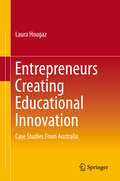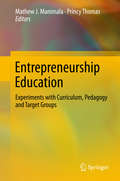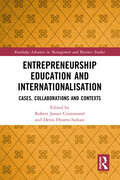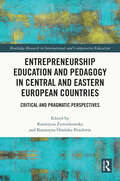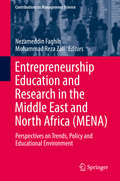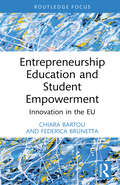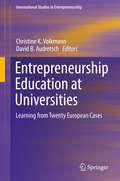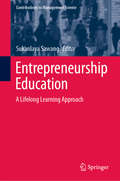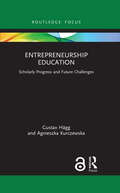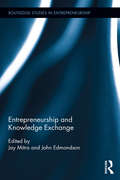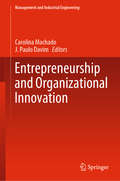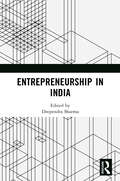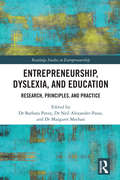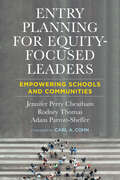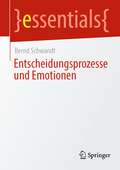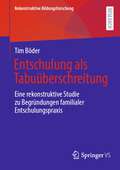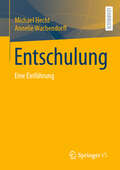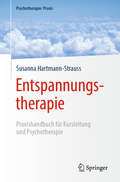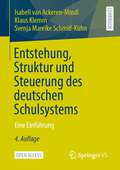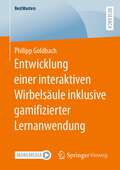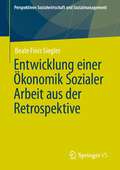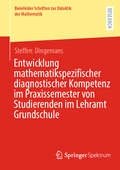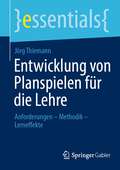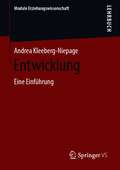- Table View
- List View
Entrepreneurs Creating Educational Innovation: Case Studies From Australia
by Laura HougazThis book examines the contribution of entrepreneurs in diversifying and redefining the tertiary education landscape in Australia. The book explores how and why entrepreneurs have decided to enter a sector which, traditionally, has been predominated by public providers.The book focuses on ways in which entrepreneurs have identified and engaged with opportunities in tertiary education, and created new educational organisations that are also, at the same time, new businesses. In so doing, they have disrupted the tertiary education sector, and their actions are having a major impact on the society, economy and educational profile of Australia, and around the world.
Entrepreneurship
by Central Board of Secondary Education The SecretaryThe CBSE's Entrepreneurship curriculum for classes XI and XII, stands out for its strong dynamism, continuous evolution and development. Since 2001, the curriculum has been changed by adopting the functional approach. In the current climate of psychological, social and economic changes, society is influenced by explosive knowledge creation and exponential technology growth. Thus the need to modify and infuse changes in the Entrepreneurship Curriculum at +2 level is a necessary step in the upgradation and updation of the existing curriculum.
Entrepreneurship Education
by Mathew J. Manimala Princy ThomasThe book provides an overview of developments in the field of entrepreneurship education, with special reference to global perspectives on innovations and best practices, as well as research in the emerging economy context. It focuses on various experiments in curriculum design, review and reform in addition to the innovative processes adopted for developing new content for entrepreneurship courses, in many cases with an assessment of their impact on students' entrepreneurial performance. Further, it discusses the pedagogical methods introduced by teachers and trainers to enhance the effectiveness of students' learning and their development as future entrepreneurs. It explains the various initiatives generally undertaken to broaden the scope of entrepreneurship education by extending it beyond regular students and offering it to other groups such as professionals, technicians, artisans, war veterans, and the unemployed. The book is a valuable resource for researchers and academics working in the field of entrepreneurship education as well as for trainers, consultants, mentors and policy makers.
Entrepreneurship Education and Internationalisation: Cases, Collaborations and Contexts (ISSN)
by Denis Hyams-Ssekasi Robert James CrammondEntrepreneurship Education and Internationalisation: Cases, Collaborations and Contexts provides a wide-ranging overview of entrepreneurship education today from a global perspective. Comprising three parts that address teaching and learning, support and outcomes, and strategic themes, international educators and researchers present examples of entrepreneurship education in action within many contexts. Chapters discuss across many academic fields and taught disciplines, involving many industry stakeholders concerning enterprise and business creation and development, and acknowledge policy and policymakers within local, national, and international government or educational forums.Chapters showcased within this edited book range from collaborative teaching case studies, course teaching styles and assessment strategies, and display links with national or international industry partners. Furthermore, incubation opportunities, examples of accelerator and university start-ups or spinouts, cross-continent partnerships for entrepreneurship, and other relevant enterprising activity between universities and industry or societal groups are also examined and appreciated.
Entrepreneurship Education and Pedagogy in Central and Eastern European Countries: Critical and Pragmatic Perspectives (Routledge Research in International and Comparative Education)
by Katarzyna Żyminkowska Katarzyna Ożańska-PonikwiaThis insightful edited collection brings new insights and a novel approach to entrepreneurship education by situating findings within the Central and Eastern European (CEE) countries, exploring pedagogies associated with both academic and professional entrepreneurship to further the field. Drawing on experiences and best practices within the CEE countries (such as Poland, the Czech Republic, Hungary, and Slovakia), the book takes a comparative slant and addresses the call for a pragmatic and critical approach to entrepreneurship pedagogy, offering a systematic review of effective methods and tools introduced at various levels of entrepreneurship education and across disciplines. Highly cross-disciplinary and spanning all levels of formal education, the contributions address long-associated challenges to entrepreneurship education such as the advancement of an entrepreneurship pedagogy that teaches both for, and through, entrepreneurship, as well as difficulties surrounding the teaching of an entrepreneurial mindset, competence, and the collation of knowledge in the field more widely. This volume will be of pivotal interest to researchers, scholars, and post-graduate students in the fields of entrepreneurship education, international and comparative education, and pedagogy more broadly. Those specifically looking at the development of education in the CEE countries will also find the book valuable.
Entrepreneurship Education and Research in the Middle East and North Africa: Perspectives on Trends, Policy and Educational Environment (Contributions to Management Science)
by Nezameddin Faghih Mohammad Reza ZaliThis contributed volume explores and reveals the new developments, dynamics and recommendations for entrepreneurship education in the Middle East and North Africa (MENA) region. Presenting papers by respected experts in the field, it shares essential insights on the status quo of entrepreneurial education and training programs, the characteristics and motivations of early stage entrepreneurs, and the regional framework conditions in MENA. The book closes with a bibliometric perspective on the trends in the entrepreneurship research and education being developed in MENA.
Entrepreneurship Education and Student Empowerment: Innovation in the EU (Routledge Focus on Business and Management)
by Federica Brunetta Chiara BartoliA scholarly work that explores the intersection of entrepreneurship education, innovation, and student empowerment within the European Union, this book investigates the transition from student to entrepreneur. It provides an in-depth analysis of the theoretical and empirical aspects of entrepreneurship education. With a field approach, including case studies and a quantitative review of university-level entrepreneurship courses across Europe, it offers a robust framework for fostering entrepreneurial skills and understanding how entrepreneurship education fosters innovation within the EU. It explores key factors driving student entrepreneurship, offering insights into the development of essential competencies such as soft skills, technical knowledge, and interpersonal abilities. Through practical applications, the book bridges the gap between education, research, and practice, providing practical recommendations for enhancing entrepreneurship education across Europe. Targeted towards academics, postgraduate students, and practitioners interested in entrepreneurship, edutech, and educational dynamics, it is particularly relevant to scholars in entrepreneurship education and innovation, offering valuable insights into how to empower students and foster entrepreneurial ecosystems in the EU.
Entrepreneurship Education at Universities
by David B. Audretsch Christine K. VolkmannThis volume discusses entrepreneurship education in Europe on the basis of in-depth case studies of related activities at twenty higher education institutions. Based on a model of entrepreneurship education, the analysis addresses curricular and extra-curricular teaching, as well as the institutional and stakeholder context of delivering entrepreneurship education within higher educational institutions. The book offers both insightful entrepreneurship teaching practices and a discussion of potential organizational drivers and barriers. Accordingly, it provides a valuable resource for researchers, instructors, and managers of entrepreneurship education alike.
Entrepreneurship Education: A Lifelong Learning Approach (Contributions to Management Science)
by Sukanlaya SawangThis book explores how entrepreneurship education can be embedded throughout the learner’s lifetime. To date, entrepreneurship education has tended to begin on an ad hoc basis at the higher education level: some institutions offer it as an elective or compulsory course, while others offer it as a degree program. In most countries, entrepreneurship has not yet been widely adopted in the core curriculum, and formal entrepreneurship education is almost exclusively offered to young learners. In addition to presenting critical views on who can benefit from entrepreneurship education, including children/schoolchildren, students in higher education and older people, the book proposes a model of holistic entrepreneurship education to promote a lifelong learning journey for educators and learners alike.
Entrepreneurship Education: Scholarly Progress and Future Challenges (Routledge Focus on Business and Management)
by Gustav Hägg Agnieszka KurczewskaThe discussion around whether entrepreneurship can be taught is becoming obsolete as the number of entrepreneurship courses, specializations and degrees is rising at an unprecedented rate all over the world and the demand for entrepreneurial education teachers or instructors is constantly growing. The global community of entrepreneurial education proponents is enthusiastic about the possibility of spreading the idea of entrepreneurship, as it is believed to benefit societies and economies in addition to influencing human development on an individual level. The fervour is nurtured by public policies and the development of an enterprising culture in the public discourse. In this discourse, entrepreneurship is treated as a panacea for numerous social and economic problems. This book is a solid reference point for all who are interested in conducting research on entrepreneurial education or engaged in teaching entrepreneurship. It is a compendium of knowledge about entrepreneurial education as a research field, seen from the perspective of the last four decades, its complete contemporary history. It reviews the progress of the field from the outset to the present in terms of its socio-economic context, changes in the academic community, but also its research focus and methodological development. This uniquely comprehensive book is a resource of both knowledge on entrepreneurial education research and inspiration for future studies within the field. This timely and relevant book provides practical insights for educators when developing their teaching practice and will be of interest to entrepreneurship educators and entrepreneurship education researchers.
Entrepreneurship and Knowledge Exchange (Routledge Studies in Entrepreneurship)
by Jay Mitra John EdmondsonOver the last several decades there has been a growing interest in the relationship between entrepreneurship and university-industry collaboration, namely how such cooperation can benefit entrepreneurship development at individual, national, and regional levels. While there are several refereed journal articles on different aspects of university-industry cooperation, most studies dwell primarily on instruments such as spin-offs, incubators and graduate entrepreneurs. This collection offers the first book-length compendium of international comparative perspectives on university-industry cooperation. Entrepreneurship and Knowledge Exchange explores insights from a wide variety of countries of relevance to researchers as well as policy and decision makers, especially those working in developing economies. Seminal contributions from top academics in the field, such as Alan Gibb, Peter Scott, and Mary Walshok, are included. The issues of knowledge transfer, entrepreneurship, and regional/national economic regeneration have inspired countless programs and initiatives at national and regional levels, and the chapters in this book examine these initiatives, providing both a reference work and a record of practical experience.
Entrepreneurship and Organizational Innovation (Management and Industrial Engineering)
by J. Paulo Davim Carolina MachadoThis book focuses on the process of designing a new business, known as entrepreneurship. It gives emphasis to the deep relationship between entrepreneurship and organizational innovation. This book provides a wide range of information and knowledge, namely: - on the different initiatives to be developed in order to promote an entrepreneurial culture; - on the different types and levels of innovation and organizational change to be implemented by organizations; - on the possible strategies to be developed with a view to fostering qualified entrepreneurship through a strong training component; -on the involvement of the different agents of innovation to equip the promoting entrepreneurial projects teams with scientific and technical knowledge in the different areas of intervention, such as marketing, finance, human resources management, the protection of intellectual property, techniques to persuade investors, etc.This book contributes not only to the transmission of knowledge and know-how in what concerns the techniques, procedures and strategies of entrepreneurial management, but also, and above all, to the construction of the behaviors, characteristics and entrepreneurial attitudes, leading to high levels of success in the business world.
Entrepreneurship in India
by Deependra SharmaThis book introduces readers and students to the entrepreneurial process. It is important as evidence has suggested that the probability of entrepreneurs’ success enhances when they thoroughly appreciate the components of the entrepreneurial process as well as how to effectively use them. The fact that nearly 33 percent of new firms fail within the first two years while twenty percent fail within four to five years of their existence makes it evident that while many people are highly motivated to start new firms, motivation alone is not sufficient, rather it should be coupled with relevant information, a strong business idea, a well-crafted business plan, and sound execution to maximize chances for success. This work offers an insightful and a practical guide to the process of launching and growing an entrepreneurial organisation with success. It will therefore serve as an important resource to students of Entreprenuership and to anyone interested in the field, academically or practically.
Entrepreneurship, Dyslexia, and Education: Research, Principles, and Practice (Routledge Studies in Entrepreneurship)
by Barbara PaveyThe development of entrepreneurial abilities in people with dyslexia is a subject of great interest. It has gained increasing importance in economically difficult times because of its potential for the development of new business opportunities. This book brings together contributions from researchers, educators, and entrepreneurs with dyslexia, investigating this subject from many perspectives. Is there something different in the profile of a person with dyslexia that supports the development of entrepreneurship? This book aims to draw out key themes which can be used in education to motivate, mentor, and create the business leaders of tomorrow. It offers a fundamental text for this area of study with a comprehensive, international examination of its topic. It includes views by new and established international writers and researchers, providing up-to-date perspectives on entrepreneurship, dyslexia, and education. It is accessible to read, to understand, and to learn from, and is suitable for recommended reading for graduate and postgraduate students. The diverse views and perspectives demonstrated in this book make it as relevant as possible for a wide group of readers. It informs study in the fields of business and dyslexia, and will be of interest to educators, researchers, and to anyone interested in the overlap of entrepreneurship and dyslexia.
Entry Planning for Equity-Focused Leaders: Empowering Schools and Communities
by Jennifer Perry Cheatham Rodney Thomas Adam Parrott-ShefferA vital resource for educational leaders, Entry Planning for Equity-Focused Leaders introduces an equity-minded process for intentional entry planning that sets the stage for sustainable change within organizations.In this practitioner-focused and action-oriented work, Jennifer Perry Cheatham, Rodney Thomas, and Adam Parrott-Sheffer consolidate their extensive experience centering equity in leadership. They affirm that the entry of a new leader, or the pivot of an established one, affords an unparalleled opportunity to garner the insight, trust, and commitment that will establish a basis for positive, equitable transformation within a system.This essential work provides a flexible framework for leadership entry that is customized to fit the complex social, political, and economic demands of a given organization and the community it serves. It highlights how such an approach prepares leaders to begin addressing one of the most entrenched and persistent issues in education: structural and systemic racism.Appealing to community and school leadership at all levels—superintendents, principals, project managers, and nonprofit partners, among others—the book presents seven components needed to enact an entry plan, from understanding context, to establishing transparency, to galvanizing partners for action. Through case studies and interviews, the authors explore the key skills necessary for each component. They then offer a wide range of supplementary tools and exercises to help leaders begin or recast their tenures and advance their agendas successfully.The process outlined here encourages readers to reflect, take calculated risks, and chart new paths. This book gives leaders the means to make necessary, meaningful progress.
Entscheidungsprozesse und Emotionen (essentials)
by Bernd SchwandtIn diesem Essential wird das Zusammenspiel von Emotionen und kognitiven Prozessen bei Entscheidungen dargestellt. Grundlage dafür bildet das Modell der vier kognitiven Systeme der Motivation in der PSI-Theorie von Julius Kuhl. Dabei geht es um die Wechselwirkungen von Gefühlen und Denkprozessen. Gefühle werden dabei als Form von automatisierter Informationsverarbeitung und als notwendiges Steuerungssystem für kognitive Prozesse verstanden.Im zweiten Teil werden Konzept und Grundannahmen des Züricher Ressourcen Modells (ZRM) vorgestellt, ein ressourcenorientiertes und neurobiologisch begründetes Trainingskonzept zum Selbstmanagement, das (u.a.) die Theorie von Kuhl praktisch umsetzt. Sie erfahren dabei, welche Möglichkeiten es gibt, ein Ziel in seinem Weg vom Bedürfnis bis zur automatisierten Handlung zu begleiten.
Entschulung als Tabuüberschreitung: Eine rekonstruktive Studie zu Begründungen familialer Entschulungspraxis (Rekonstruktive Bildungsforschung #40)
by Tim BöderMit der Verwirklichung familialer Entschulung vollzieht die sogenannte ,Freilernerbewegung‘ eine Tabuüberschreitung, die angesichts des kulturhistorisch geltenden Beschulungsnormativs unter enormem Begründungsdruck steht. Daran anknüpfend fragt die rekonstruktive Studie, welche strukturellen Gesetzmäßigkeiten den Krisenszenarien und sinnstiftenden Idealentwürfen von Eltern bei der sinnstiftenden Begründung zur familialen Entschulungspraxis zugrunde liegen. In diesem Zuge werden mit dem Verteidigen, Charismatisieren und Entkommen drei Strukturtypen der Begründung familialer Entschulungspraxis erschlossen. Damit leistet die Studie nicht nur einen empirisch fundierten Beitrag zu einer Neuthematisierung schulalternativer Bildungspraktiken, sondern stößt auch selbst in eine Tabuzone von Schulpädagogik und -forschung vor, weil sie die Schule zwar als historisch konsolidierte, aber nicht als alternativlose Organisation für Lern- und Bildungsprozesse von Kindern und Jugendlichen thematisiert.
Entschulung: Eine Einführung
by Michael Hecht Annelie WachendorffIm Buch wird das Konzept der Entschulung anhand von drei Hauptformen vorgestellt: Entschulung der Gesellschaft, Entschulung des Lernens (Freilernen und Homeschooling) und Entschulung der Schule. Die historischen und theoretischen Bezüge sind leicht verständlich aufbereitet und praktische Beispiele liefern Einblicke in eine Bewegung, die zunehmend mehr Bedeutung in der bundesdeutschen Bildungslandschaft gewinnt. Die politische Brisanz und die bemerkenswerten Ähnlichkeiten in der praktischen Umsetzung der sehr unterschiedlichen Ansätze wird nachvollziehbar und fordert zum Nach- und Weiterdenken heraus.
Entspannungstherapie: Praxishandbuch für Kursleitung und Psychotherapie (Psychotherapie: Praxis)
by Susanna Hartmann-StraussDieses Buch bietet eine praxisorientierte Hilfe zur Gestaltung von Entspannungskursen und Einzelsitzungen. Die beiden verbreitetsten Verfahren, Progressive Relaxation und Autogenes Training, werden so umfassend dargestellt, dass das Handbuch als praktischer Kursleitfaden dienen kann. Im Mittelpunkt steht jedoch nicht die Methode, sondern Aufbau, Ablauf und Gestaltung der Kurssituation sowie das nötige psychologische und entspannungsspezifische Wissen. Die Kenntnisse lassen sich auf andere Verfahren, wie bspw. Imagination oder Achtsamkeit, ebenso anwenden. Neben dem psychotherapeutischen Einsatz in Praxis und Klinik ist das Werk auch für die Anwendung in der Prävention geeignet. Es erläutert die Unterschiede in den verschiedenen Kontexten ebenso wie Strategien bei speziellen Zielgruppen und Themen (z. B. bei Schmerzpatienten und Schlafstörungen). Aus dem Inhalt: Zielgruppenorientierte Erklärungen – Übungsanleitungen und Vorgehensweisen – konkrete Umsetzung im Kurs – entspannungsspezifisches Wissen und psychologische Grundlagen – Motivationsaufbau und Transfer in den Alltag – Umgang mit Problemen und Störungen im Kursverlauf. Die Autorin: Susanna Hartmann-Strauss ist Diplompsychologin, Psychologische Psychotherapeutin, Systemische Therapeutin und Supervisorin. Sie arbeitet kassenzugelassen in eigener Praxis und bildet seit mehr als 15 Jahren Entspannungstrainer in präventiven und therapeutischen Kontexten aus.
Entstehung, Struktur und Steuerung des deutschen Schulsystems: Eine Einführung
by Klaus Klemm Isabell van Ackeren-Mindl Svenja Mareike Schmid-KühnFür jene, die (künftig) als Lehrkräfte oder in anderen Positionen im Kontext von Schule arbeiten, ist es unerlässlich, über ein orientierendes Wissen zum Schulsystem zu verfügen. In Anlehnung an die Themenstruktur der Module zum bildungswissenschaftlichen Studium bietet dieses Open-Access-Lehrbuch in komprimierter und präziser Form zentrale, wissenschaftlich fundierte Grundlagen zur Entstehung, Struktur und Steuerung des deutschen Schulsystems und seiner Qualitätsentwicklung. Eine konzentrierte Themenwahl und die grundlegende Einführung zentraler Begriffe und problemorientierter Zusammenhänge garantieren ein vertieftes Basiswissen, das sowohl im Rahmen von Lehrveranstaltungen als auch zur Prüfungsvorbereitung unentbehrlich ist. Hierzu tragen auch Reflexionsaufgaben am Ende aller Kapitel bei.Über eine grundlegende Aktualisierung der herangezogenen Forschungs- und Datenlage hinaus bietet die 4. Auflage nun einen systematischen Blick auf die (nicht) staatlichen Akteure, die aufunterschiedlichen Ebenen des Bildungssystems Einfluss nehmen. Darüber hinaus werden Querschnittsthemen (wie Inklusion und Digitalisierung) stärker akzentuiert, die das Bild von Schule prägen.
Entwicklung einer interaktiven Wirbelsäule inklusive gamifizierter Lernanwendung (BestMasters)
by Philipp GoldbachDer Forschungsschwerpunkt in diesem Buch umfasst die Untersuchung der aktuellen Lehrparadigmen in der medizinischen Lehre sowie eine Analyse von Bildungstechnologien, welche unterstützen können, den Lernprozess interaktiv und anschaulich zu gestalten. Dabei stand die Entwicklung einer solchen Bildungstechnologie in Form eines interaktiven Wirbelsäulenmodells im Fokus dieser Arbeit. In einer Analysephase wurden zunächst die Anforderungen durch Studierende und Dozierende an ein solches System gesammelt. Daraufhin erfolgte die Konzeption und Realisierung eines technologisierten Wirbelsäulenmodells, welches speziell in der medizinischen Lehre unterstützen soll. Dieses Modell wurde durch eine gamifizierte Lernanwendung ergänzt, mit dem Ziel, den Lernprozess motivierend zu gestalten. Abschließend wurde evaluiert, inwiefern diese Kombination aus einem interaktiven Modell und der Lernanwendung den Lernprozess anreichern kann und ob diese einen positiven Einfluss auf die Lernmotivation von Studierenden nimmt.
Entwicklung einer Ökonomik Sozialer Arbeit aus der Retrospektive (Perspektiven Sozialwirtschaft und Sozialmanagement)
by Beate Finis SieglerDer Band lässt 30 Jahre Beschäftigung der Autorin mit der Ökonomik Sozialer Arbeit Revue passieren, die in der Entwicklung eines alternativen Ökonomiemodells mündet. Mit dem Ansatz einer Autonomie fördernden Meritorik wird ein Analyserahmen für Soziale Arbeit vorgestellt, der Konsumentensouveränität neu interpretiert und mit einem ressourcenorientierten, auf Befähigung angelegten Ansatz in der Sozialen Arbeit kompatibel ist. Er ist zudem geeignet die Verflechtung von individueller Lebenslage, Sozialer Arbeit als personenbezogener sozialer Dienstleistung, Sozialmanagement, Sozialwirtschaft und Sozialpolitik bei der Erzeugung von Wohlfahrt angesichts knapper Ressourcen zu untersuchen. Wie viele Ressourcen sollen für was und wen mit welchem Ziel warum und wozu von wem wie zur Verfügung gestellt werden?
Entwicklung mathematikspezifischer diagnostischer Kompetenz im Praxissemester von Studierenden im Lehramt Grundschule (Bielefelder Schriften zur Didaktik der Mathematik #17)
by Steffen DingemansDie Qualität eines Unterrichts, der sich an den individuellen Voraussetzungen der Schulkinder orientiert, hängt maßgeblich mit der diagnostischen Kompetenz der Lehrkraft zusammen. Folglich ist die Entwicklung dieser eine grundlegende Aufgabe aller drei Phasen der Lehrkräftebildung. In der vorliegenden Studie wird das Praxissemester als struktureller Bestandteil der ersten Phase der Lehramtsausbildung fokussiert und die Wirkung auf die Entwicklung mathematikspezifischer diagnostischer Kompetenz untersucht. Den Kern der als mixed-method angelegten längsschnittlichen Evaluation stellen vier Videovignetten dar, zu denen die Studierenden aus dem Grundschullehramt in einer Online-Umfrage mit offenen Antwortformaten aufgefordert wurden, die Lösungswege von Kindern zur Addition und Subtraktion fachlich angemessen zu analysieren. Die Ergebnisse bestätigen einerseits die geringe Effektivität vor allem der schulischen Praxisphase. Anderseits werden auf Basis der vorliegenden Daten relevante Bedingungsfaktoren herausgearbeitet und Verbesserungsmöglichkeiten für die universitäre und schulische Phase des Praxissemesters diskutiert.
Entwicklung von Planspielen für die Lehre: Anforderungen – Methodik – Lerneffekte (essentials)
by Jörg ThiemannDie Anforderungen an Aus- und Weiterbildungen ändern sich stetig und werden immer komplexer. Sie sind mittlerweile so vielfältig, dass ihnen kaum eine einzelne Lehrmethode gerecht werden kann, um Kompetenzen zu vermitteln. Neben Blended Learning oder Gamification werden auch Planspiele als Lehrmethode eingesetzt. Dieses Buch gibt zahlreiche Anreize und beschreibt anhand eines methodischen Vorgehens, wie mit einem wissenschaftlichen und transparenten Prozess, Planspiele für die Lehre entwickelt werden können.
Entwicklung: Eine Einführung (Module Erziehungswissenschaft #2)
by Andrea Kleeberg-NiepageIn diesem Lehrbuch wird Entwicklung als wissenschaftliches Denkmodell zur Beschreibung des menschlichen Lebenslaufes wissenschaftshistorisch und konzeptionell eingeordnet. Zentrale Theorien menschlicher Entwicklung werden ebenso vorgestellt wie Konzeptionen zu Störungen von Entwicklungsprozessen. Zusammen mit Betrachtungen zum Stand der Forschung und der Forschungsmethoden liefert diese Einführung klar und verständlich zentrale Grundlagen, die Studierende in erziehungswissenschaftlichen, pädagogischen und sozialen Handlungsfeldern benötigen.
